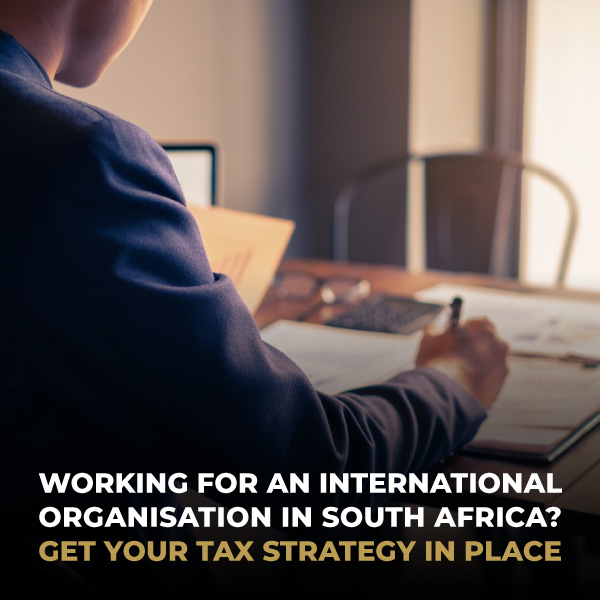WORKING FOR AN INTERNATIONAL ORGANISATION IN SA?
GET YOUR TAX STRATEGY IN PLACE
South African residents who work for international companies inside South Africa need to be sure they have a clear understanding of their tax situation or risk losing out, says Thomas Lobban, Legal Manager for Cross-Border Taxation at Tax Consulting South Africa.
“A growing number of South Africans are electing to work abroad, but there is also a substantial group that is working here for foreign companies,” he says. “While these individuals’ tax situation might seem straightforward, there are permutations to watch out for. As always, when it comes to cross-border tax, it’s best to get things clear from the get-go or risk negative consequences later.”
Mr Lobban says that it all depends on where one is tax resident, and where the source of one’s income is located—in the context of employment, this is generally where the services are physically performed. A South African who performs work for a foreign company while tax resident in South Africa, and whose work is physically executed here, should pay South African tax, and the foreign employer in this case should generally not withhold tax on that employment income.
However, determining tax residence is an exhaustive process and not necessarily straightforward. “In my experience, people seldom get it right on their own,” he says. “In most cases, tax should be paid in South Africa and the foreign company should not withhold any tax but it’s best to be quite sure by dotting the i’s and crossing the t’s in every single circumstance.”
Another set of scenarios is becoming more common as remote working becomes a viable option. A South African living in South Africa but working for a foreign company digitally opens him- or herself up to double-taxation issues.
A possible scenario would be that a South African resident performs services for a foreign company using digital technologies, and those services are delivered or consumed outside of South Africa. It’s entirely possible that the different tax authorities involved would see themselves having a right to levy tax on that individual.
The essential point here is not to assume that because tax has been paid somewhere that all the tax authorities will be happy. The correct taxes must be paid in each jurisdiction, and care must be taken to get this right or one could find oneself paying tax twice and then having to apply for refunds, with a significant impact on cash flow.
It’s also worth noting that some countries’ tax authorities are notorious for never refunding incorrectly paid tax.
“As the world becomes more connected, and as technology becomes entrenched as a working medium, the working environment will become more complex and nuanced—and the tax situation will require more attention,” Mr Lobban concludes.
“There is no need to let tax issues prevent one from taking advantage of the work opportunities that are emerging, and one should certainly never end up paying double tax, but it’s important to get things right from the outset. Working closely with a tax practitioner who has expertise in both jurisdictions is an absolute need in this regard.”
![2025-logo-[Recovered] Tax Consulting South Africa](https://www.taxconsulting.co.za/wp-content/uploads/2025/01/2025-logo-Recovered.png)





